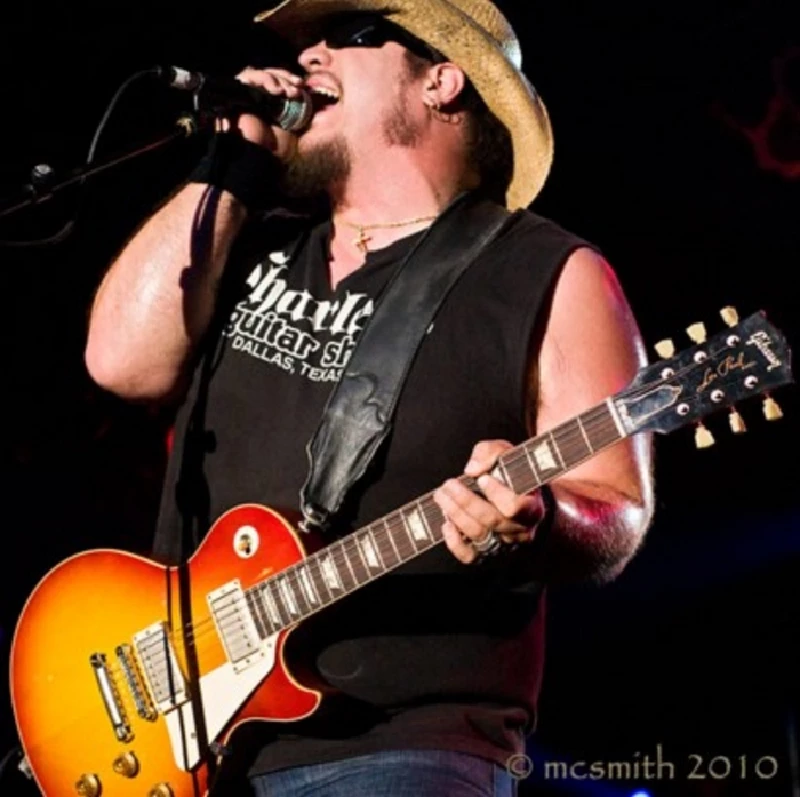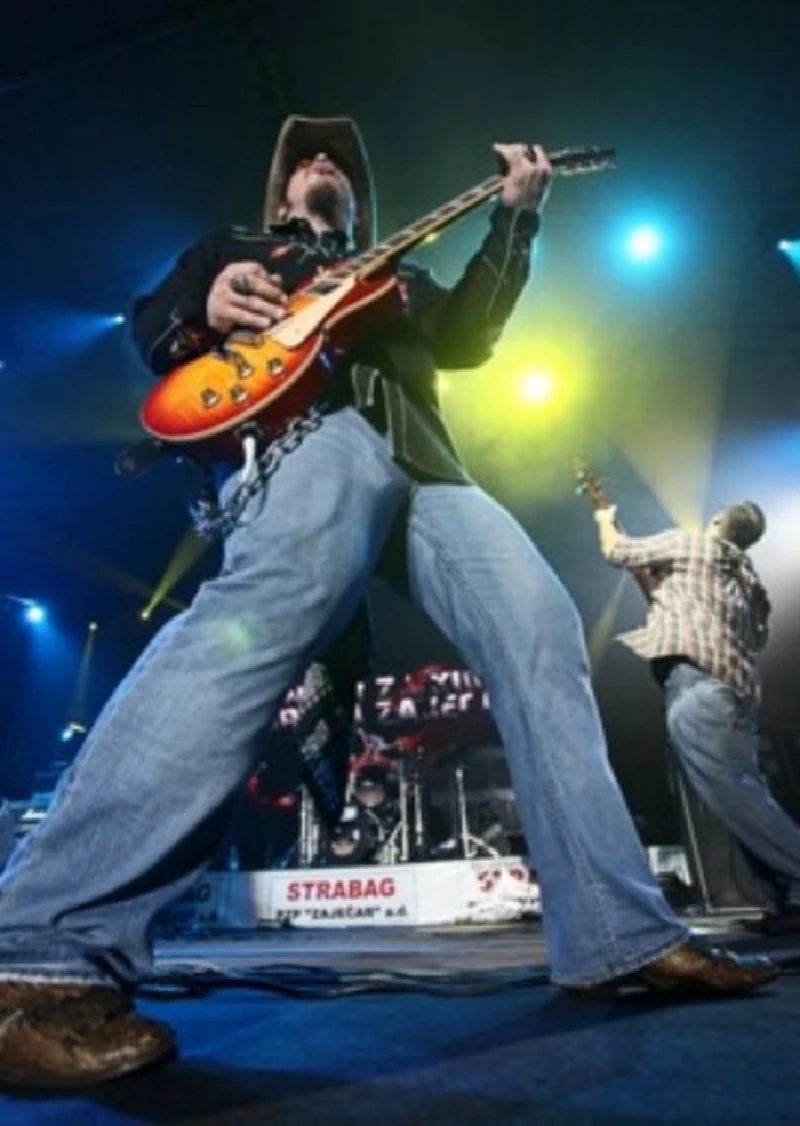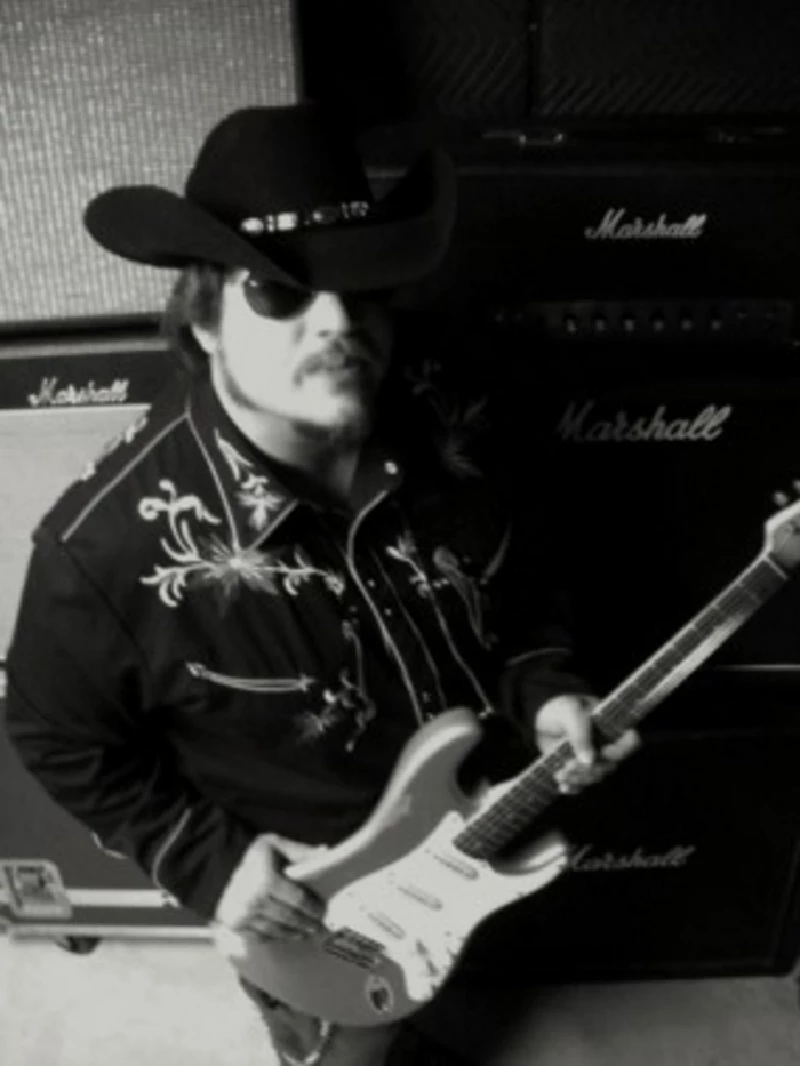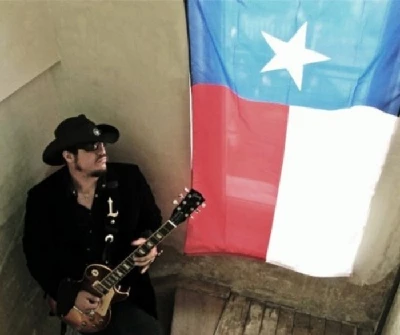Lance Lopez - Interview Part 2
by Lisa Torem
published: 4 / 12 / 2010

intro
...while in the second part he talks about touring with Joe Bonemassa and Buddy Miles and his latest album, 'Salvation From Sundown'
PB: You have opened for guitarist Joe Bonamassa. Did Joe’s eclectic style impact you? LL: After 'Wall of Soul' was released I was so happy with it. About a month after the release of 'Soul' I was watching the Grammys and Jay Newland, who I worked with on my first disc, won about seven or eight Grammys with Norah Jones and I was blown away. I was sitting at home watching TV and all of a sudden there's Jay on TV winning Grammy after Grammy. So I called him the next morning, and said, "I have this really great new disc." He said "Great, send it over. I was at the Grammys last night hanging with both John Mayer and Jack White and your name came up.” So I said, "I know I saw you win all those awards.” So I sent him 'Wall of Soul' and he completely panned it. He told me, "This is terrible, it sounds like a Robin Trower/Jimi Hendrix rip-off record" (Laughs). I was crushed. He said, "You need to be modern rock like Stone Temple Pilots or Alice in Chains!" That was so strange hearing it from a blues and jazz guy. He told me he had the ear of Capitol Records since his success with Norah and if I wanted to do anything it had to be heavy modern rock. So I put together a band called Cold Distance with a couple of guys that were heavy rock players from Austin and another blues guitarist from Dallas. And I began writing material influenced by my friends King's X and also Sabbath and Zeppelin. One of our first gigs was opening for Joe Bonamassa on New Year's Eve in Lubbock, Texas. We were great and Joe really loved the band because we were so heavy, yet still very bluesy. But at that point, I thought, "Wait a minute, Joe is out here doing okay and getting better and better and he's still playing blues-rock. Maybe what Newland had told me was wrong." But there again, personal issues within the band and drugs and alcohol played a key role into that project being very short-lived. Later on that year some people would tell me they were hanging with Bonamassa after shows and they asked him if he knew me and he would say, "Oh yeah, does he still have that really great heavy band?" and most people wouldn't even know what he was talking about because it was so short lived. I love Joe's playing and whenever I have the opportunity to see him, all we ever talk about is gear, amps and guitars. That’s one of the things I love most about Joe is that he is someone I can always talk gear with, whenever I see him. Oh, and we also talk about our other great love; eating (Laughs). Joe is looking great these days and has really cut back on the snacks, and so have I...a little (Laughs). Okay, I'm trying (Laughs). One of the last conversations me and Joe had was about dieting as we stood over a five-star buffet. But, yeah, Joe is a great inspiration to us all. I hope we get the chance to record together soon. PB: In 2007, 'Higher Ground' was released on which you played all of the instruments. Would you do that again or do you prefer the energy of a band in the studio? LL: That was a complete fluke. I played all the instruments because the band I had didn't show up to the sessions (Laughs). I cancelled the first session when no one showed and then when no one turned up the next day I said, "To hell with them I'll do it myself!" (Laughs) It was completely draining and a beat down. I was at the height of my addiction, My wife had left me and everyone was turning their back on me. Most of the material on there is very angry, so being able to play drums and stuff, was a huge stress reliever in some ways. I was very proud of the way ‘El Paso Sugar’ turned out though. And ‘Higher Ground’ also marked the beginning of me recording with Gibson's. I was playing Les Pauls with ‘Cold Distance’ and the tracks I recorded with that project were so great and huge sounding. I had always recorded with Stratocaster and I began recording with a Les Paul on those sessions. I loved the warmth and fatness of the Les Paul. So that disc was half and half, half Strat, half Les Paul...much like ‘Salvation’ in some respects as far as choice of guitars. As far as playing all of the instruments I still do that from time to time. I just had some sessions over in Germany back this past summer and I cut around seven demo tracks for my upcoming disc. That way I can give the band, which is going to play on the sessions, a guideline of what I'm doing and where I want the piece to go. Lucky Peterson and Buddy Miles were very adamant that I be proficient on all the instruments in my band, and here is where it paid off. The band didn't show up or I'm alone in the studio; I can still move forward. One of the funniest things I ever heard about playing all the instruments on that disc was what the East Texas engineer Robin Brian (who did the first five ZZ Top albums at his studio Robin Hood Brian in Tyler, Texas) said to me after he heard 'Higher Ground', "Lance, when you play all the instruments yourself...that's creative incest" (Laughs). PB: In 2008, you toured Europe in support of Ten Years After, Jimmy Cliff and ZZ Top. How do you keep your style distinct when playing with these legends? LL: Well, when I walk out on that stage it's time to be Lance Lopez and play the guitar like Lance Lopez does. I am very grateful that I have shared the stage with a lot of the musicians who have inspired me. Billy Gibbons has been a mentor of mine since I was sixteen but 2008 was the first time we actually worked together and we had a blast. We didn't want it to end. Hopefully, there will be some more ZZ Top/Lance Lopez shows in the near future. But to answer your question, I just do what comes natural when I walk out there... PB: Your newest release, 'Salvation From Sundown', was produced by acclaimed producer Jim Gaines. You’ve got Tony Valdez on bass and Cody Norman on drums. There’s a really full sound to the album, yet you’ve got a simple set-up. Had you thought about adding other instruments? LL: It was and is a pure honour to work with Jim Gaines; I call him Uncle Jim because he's so encouraging and supportive and has made tons of great records. The band I used on 'Salvation' was the road band I was working with at the time. I took them into Universal Rehearsal Studios in Dallas and just worked on the material until it was right and then Jim came in on the last day of pre-production and changed just a couple of tiny things. That’s what Jim does, he polishes things and makes them shine very bright; that’s why he is so special. All the pre-production was done at Universal Rehearsal in Dallas, then we began recording at Luminous Sound in Dallas. After a couple of weeks I needed a change of scenery and I had to go play some shows out in California, so when I got back from the West Coast we moved the sessions to Ardent Studios in Memphis. I felt at home at Ardent and that is Jim's home studio so he was happy as well. When we began working at Ardent, the band Lucero was in the A room and we were back in C room. Rick Steff, their keyboard player, heard what we were working on and asked Jim if he could play on some of the tracks. I had two in particular that needed keys, especially the Ray Charles song ‘It Should've Been’ and the ballad ‘Why?’ We debated about putting keys on 'Neverlove' but for some reason we didn't, I think we even talked about bringing the Memphis Horns in on 'Neverlove'. I think it was because we had to duplicate this live and we didn't want to go too crazy with other instruments and then not be able to duplicate it live. But, yeah, I would love to have a keyboard player or another guitarist...It frees me up and allows me to perform, as opposed to a trio where I am playing rhythm, lead, singing and performing. I, however, also love playing as a trio as well. Eventually, I hope to add more pieces to the band though. PB: I wanted to talk about some specific songs and your writing. In ‘My Good Thing’ you wail, “Ain’t gonna tell nobody ‘bout my good thang/‘Cause if I do, now, they might take it away.” This is a great line and your voice suits the intensity so well. But, it has that feel of a traditional blues tune that we might have heard before. It’s a new idea in an old bottle type of thing. Where did you get the line and how did you match it with that guitar riff? The second question is this: You sing, “Ooooh, eee, you’re a fine, sexy woman, the kind I truly like.” I just heard an interview with Keith Richards in which he talked about the placement of vowels in a song. Did that expression come to you easily or through trial and error? LL: Yeah. 'Good Thang' is steeped in my New Orleans roots. That riff and the whole thing comes from early days in New Orleans. I wrote it years ago, and it is something I have had tucked away for quite some time. I am playing horn riffs on my guitar and the lyrical content is about finding a good girl and not taking her around guys because someone might try to get up on her (Laughs). It's just some good old New Orleans French Quarter Funk. When I have been playing it live we’ve actually been throwing in the Meters' 'Cissy Strut' riff in there. But the lyrics; they can translate into anything that you want. If you have a good thing you don't want certain individuals to know about it because they might try and take it from you. In reality, it's just singing about a fine girl with swamp funk in the background (Laughs). PB: I like the caveman imagery in ‘One Half Hour’- “I went from the bed right to the shower and I fell in love for one half hour.” Is this the male version of romance? LL: Me and Dragan Nikitovic, a promoter I work with in Europe, wrote this while we were on tour with ZZ Top in Europe...'nuff said (Laughs). No seriously, it was a riff I had for a while and we wanted to capture that whole 'La Grange' imagery and expound upon it. It's kind of a Red Light district anthem for Europe. I always think that is so hilarious every time I go to Europe. PB: ‘Heart Fixing Blues’ “I’m a heart fixer, baby, I specialize in heart repair.”I think this theme is another good one. Is it every man’s fantasy to heal a broken-hearted woman? LL: 'Heart Fixing Business' is a song I've always wanted to cover. It was on 'Years Gone By' which was the first Albert King record I ever owned. Albert King is one of my biggest guitar heroes. I always loved the story behind it as well. After we recorded it for Salvation, someone gave me a bootleg of Stevie Ray Vaughan playing it in a club down in Houston in the early 80's. SRV played it almost note for note. I tried to do my own version of it. PB: ‘It Should’ve Been Me’ “A little later on a theatre I passed…I was all set to write her name in my book/When her husband came and gave me a dirty look.” You’ve got that talking blues style here. Was this influenced by any other artist? LL: ‘It Should've Been Me’ was originally recorded by Ray Charles back in 50's. This was how he sang it so I tried to stick to the original but, there again; I did my own thing with it. Someone had given me a cassette of Ray Charles' very first sessions for Atlantic and it was all basically blues. This was all we listened to in my van on the road for a while, I said "We have got to cover one of these songs" and I chose this one, because I don't know how many times I've felt like that (Laughs). PB: The track, ‘Romeo’ was quite a surprise. I thought it would be a romantic song. Not a chance. First, can you define the style of playing you use in the intro. Is that Southern, Delta? Secondly, the song soon veers into the realm of Metal. But, I don’t hear that in the other tracks. Is this an experiment? LL: As I said before, the riff from Romeo originated from Buddy Miles and I’m jamming. The intro I wrote later. When I wrote the intro I was thinking about all the Sergio Leone/Clint Eastwood spaghetti westerns. It's very outlaw sounding to me. I wanted some music that was very heavy and angry sounding because the song is about a bad guy. There was/is a guy named Romeo who pretty much was a failed musician and he started launching personal attacks against me and every other blues rock guitarist out there. He starting making these crazy videos and posting them on you tube. So instead of me going over to his house with a baseball bat I wrote a song and took it out on him that way. PB: Lance, ‘Stubbs’ is the only instrumental on the album. It modulates like crazy and there’s a lot going on. It’s so rich that I have to ask, why did you only include one instrumental? LL: Thanks, Stubbs is my favorite Barbeque in Texas, aside from my good buddy Mike Butler's (laughs). But Stubbs is a great BBQ Joint and music venue in Austin that was originally in Lubbock. Every time we played it I thought about Austin and Stubbs BBQ so that’s where it got its title. It's kind of got that "Eric Johnson/David Grissom-alot going-on" shuffle vibe (Laughs). I had a couple of other instrumentals but Jim Gaines felt we should only include one for this disc. I still think I could've cut a better solo on it, but I always feel that way (laughs) PB: ‘Why’ is a heartfelt ballad. “Every time I want you baby/That’s when you leave me,” is a very moving line. What inspired you to write this one? LL : I wanted to capture all my bad relationships in one song. "Why" was always a question I asked myself after a relationship ended, so I wrote this piece to capture that. A relationship ending is a very painful thing and adding the Hammond Organ on there is also an inspiring thing, which is why Southern Churches use them. So it's a weird balance of sadness and inspiration all at once. PB: What’s in the future for touring and recording and which songs have been the most popular with the European audiences? LL: Well, I hope to get started on the follow- up to 'Salvation from Sundown' here in the next couple of months. I have got some really rockin' songs for the next disc, and I can't wait to get back to work with Jim Gaines. And then I'm just trying to stay as busy as possible playing everywhere I can, whenever I can. I love playing in Europe. I always have. ‘One Half Hour’, ‘Why?’ and ‘My Good Thang’ have gotten a lot of response in Europe. I can't wait to get back over and play some more, like I said, I love playing Europe. PB: Lance, what’s the most gratifying thing about being a musician? LL: That I can share with the world the talent I was blessed with. PB: Thanks, Lance.
Picture Gallery:-


interviews |
|
Interview Part 1 (2010) |

|
| In the first part of a two part interview with Lisa torem, Texan blues guitarist Lance Lopez talks about the influence of Jimi Hendrix on his music and his teenage years spent playing gigs in bars |
most viewed articles
current edition
Carl Ewens - David Bowie 1964 to 1982 On Track: Every Album, Every SongArmory Show - Interview with Richard Jobson
Colin Blunstone - Thalia Hall, Chicago, 16/7/2025
Bathers - Photoscapes 1
Visor Fest - Valencia, Spain, 26/9/2025...27/9/2025
John McKay - Interview
Billie Eilish - O2 Arena, London, 10/7/2025
Robert Forster - Interview
Sir Tim Rice - Interview
Loft - Interview
previous editions
Heavenly - P.U.N.K. Girl EPManic Street Preachers - (Gig of a Lifetime) Millennium Stadium, Cardiff, December 1999
Oasis - Oasis, Earl's Court, London, 1995
Beautiful South - Ten Songs That Made Me Love...
Pixies - Ten Songs That Made Me Love...
Paul Clerehugh - Interview
Trudie Myerscough-Harris - Interview
Prolapse - Interview
Doris Brendel - Interview
Donovan - Ten Songs That Made Me Love...
most viewed reviews
current edition
Phew, Erika Kobayashi,, Dieter Moebius - Radium GirlsAmy Macdonald - Is This What You've Been Waiting For?
Sick Man of Europe - The Sick Man of Europe
Davey Woodward - Mumbo in the Jumbo
Cynthia Erivo - I Forgive You
Lucy Spraggan - Other Sides of the Moon
Bush - I Beat Loneliness
Alice Cooper - The Revenge of Alice Cooper
Blueboy - 2
Suzanne Vega - Flying With Angels
Pennyblackmusic Regular Contributors
Adrian Janes
Amanda J. Window
Andrew Twambley
Anthony Dhanendran
Benjamin Howarth
Cila Warncke
Daniel Cressey
Darren Aston
Dastardly
Dave Goodwin
Denzil Watson
Dominic B. Simpson
Eoghan Lyng
Fiona Hutchings
Harry Sherriff
Helen Tipping
Jamie Rowland
John Clarkson
Julie Cruickshank
Kimberly Bright
Lisa Torem
Maarten Schiethart